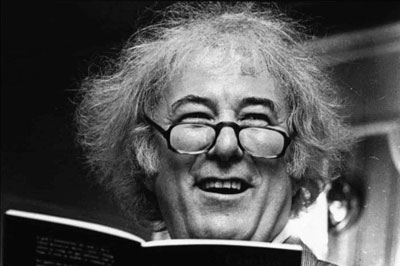
On the last Friday of August, 2013, I read the headline: Seamus Heaney dies. I have loved his poetry for years, and although I have never met him in the flesh, I feel as if I know him as a friend. I was of course shocked and saddened by his death—but also afraid of my own mortality.
I immediately turned to Heaney’s elegiac poem, “In the Attic.”
I have reached the age when the elegiac is both unavoidable and welcome. The human soul is not restrained by the physics of time and space: the boy-self (mostly unaware) is comforted and informed by his future older-man-self, and vise verse. Of course, the older-man-self has the advantage of experience and memory—in spite of the challenges age puts on him—but the boy-self certainly pulls his share of the load.
“In the Attic” begins by invoking the fictional boy/man, Jim Hawkins, in the moments after overcoming the “face of Israel Hands” (i.e. Death). The second section of the poem presents the poet’s setting and alignment: “a man marooned/ In his own loft, a boy/ Shipshaped in the crow’s nest of life . . .” Part three brings in the frailties of old age, with a ghostly visitation from the poet’s grandfather. Here there are elements of humor and pathos, as the old man’s wavering memory leads him to change Israel to Isaac: “His mistake perpetual, once and for all, like the single splash when Israel’s body fell.” The final section is the first-person poet alluding to his post-stroke “uncertainty on stairs” and “lightheadedness.” The last stanza closes and opens:
It’s not that I can’t imagine still
That slight untoward rupture and world-tilt
As a wind freshened and the anchor weighed.
For the past several weeks I have been reading sections of Robert Luis Stevenson’s Treasure Island. Stevenson’s novel has more than one mention concerning the nature of the soul (or “sperrit,” as Israel Hands would have it). Just a few pages before Jim Hawkins is “aloft in the cross-trees of [the] Hispaniola,” he is questioned by the man he would shoot in self-defense.
“Well now, I’m no scholar, and you’re a lad as can read and figure, and to put it straight, do you take it as a dead man is dead for good, or do he come alive again?”
“You can kill the body, Mr. Hands, but not the spirit; you must know that already.”
I believe Seamus Heaney knows it first hand. His last words speak volumes; his borrowed phrase comforts from its source. Thanks to the courage of his son Michael, we know the final message Seamus gave his loving wife Marie—a text message, minutes before his death—Noli timere: Don’t be afraid.
Chasing Homer by László Krasznahorkai
Eight Perfect Murders by Peter Swanson
The Death of Sitting Bear by N. Scott Momaday
WHILE YOU WERE GONE BY SYBIL BAKER
MY STUNT DOUBLE BY TRAVIS DENTON
Made by Mary by Laura Catherine Brown
THE RAVENMASTER: My Life with the Ravens at the Tower of London
Let’s talk about the hard stuff: Get Out
And Then by Donald Breckenridge
One with the Tiger by Steven Church
The King of White Collar Boxing by David Lawrence
They Were Coming for Him by Berta Vias-Mahou
Enchantment Lake by Margi Preus
Diaboliques by Jules Barbey d’Aurevilly
Maze of Blood by Marly Youmans
Tender the Maker by Christina Hutchkins
Conjuror by Holly Sullivan McClure
Someone's Trying To Find You by Marc Augé
The Four Corners of Palermo by Giuseppe Di Piazza
Now You Have Many Legs to Stand On by Ashley-Elizabeth Best
Paul Rousso at Lanoue Fine Art
How To Be Drawn by Terrance Hayes
Strange Days directed by Kathryn Bigelow (1995)
Teaching a Man to Unstick His Tail by Ralph Hamilton
Domenica Martinello: The Abject in the Interzones
Twelve Clocks by Julie Sophia Paegle
Love You To a Pulp by C.S. DeWildt
Even Though I Don’t Miss You by Chelsea Martin
Revising The Storm by Geffrey Davis
Strings Attached by Diane Decillis
Put Your Hands In by Chris Hosea
I Think I Am in Friends-Love With You by Yumi Sakugawa
Box of Blue Horses by Lisa Graley
Review of Hilary Plum’s They Dragged Them Through the Streets
The Sleep of Reason by Morri Creech
American Neolithic by Terence Hawkins
The Hush before the Animals Attack by Carol Matos
Regina Derieva, In Memoriam by Frederick Smock
Review of The House Began to Pitch by Kelly Whiddon
Hill William by Scott McClanahan
The Bounteous World by Frederick Smock
Going Down by Chris Campanioni
Review of Empire in the Shade of a Grass Blade by Rob Cook
Review of The Day Judge Spencer Learned the Power of Metaphor
Review of Life Cycle Poems by Dena Rash Guzman
Review of Saint X by Kirk Nesset
Review of The Figure of a Man Being Swallowed by a Fish
Review of The Tide King by Jen Michalski
